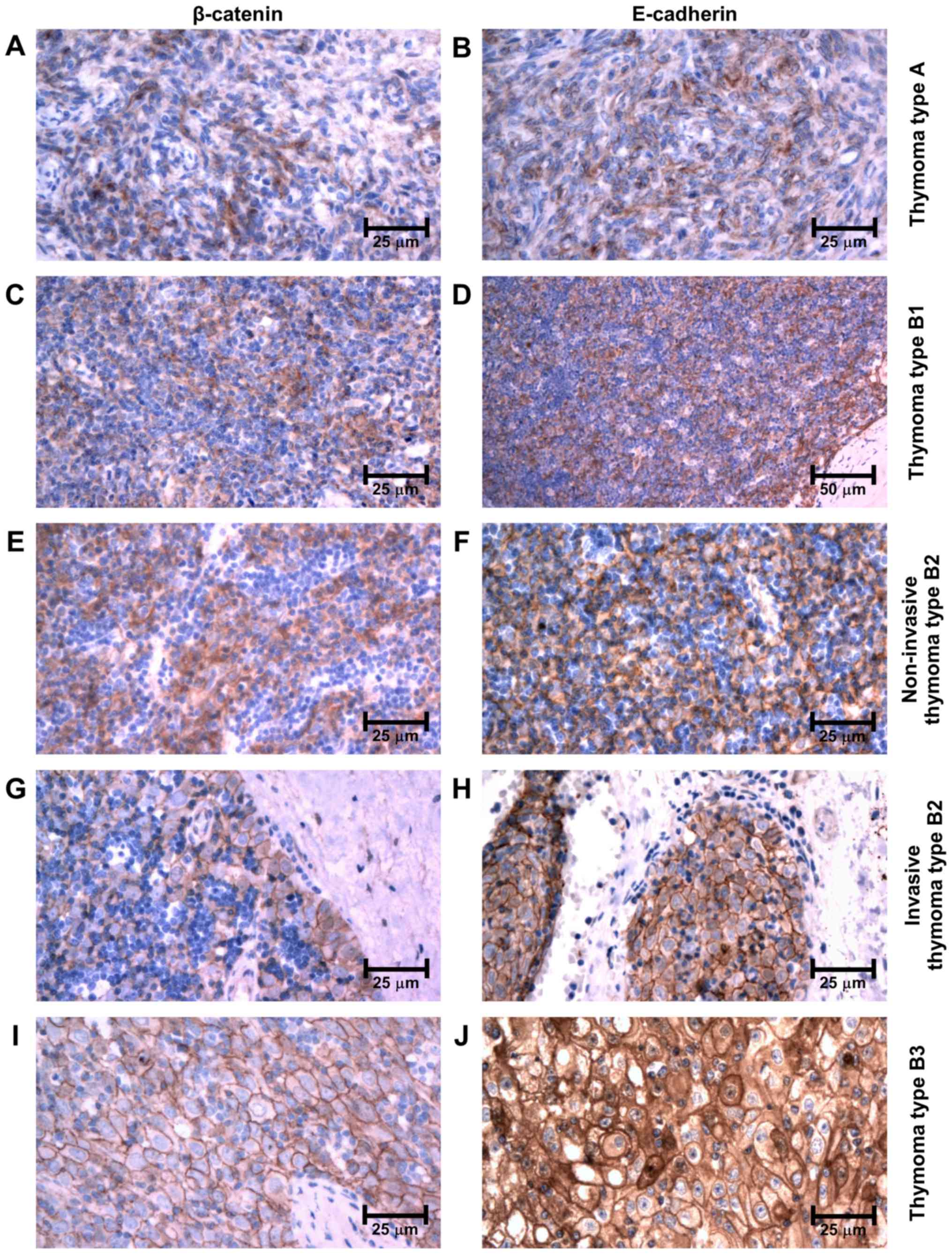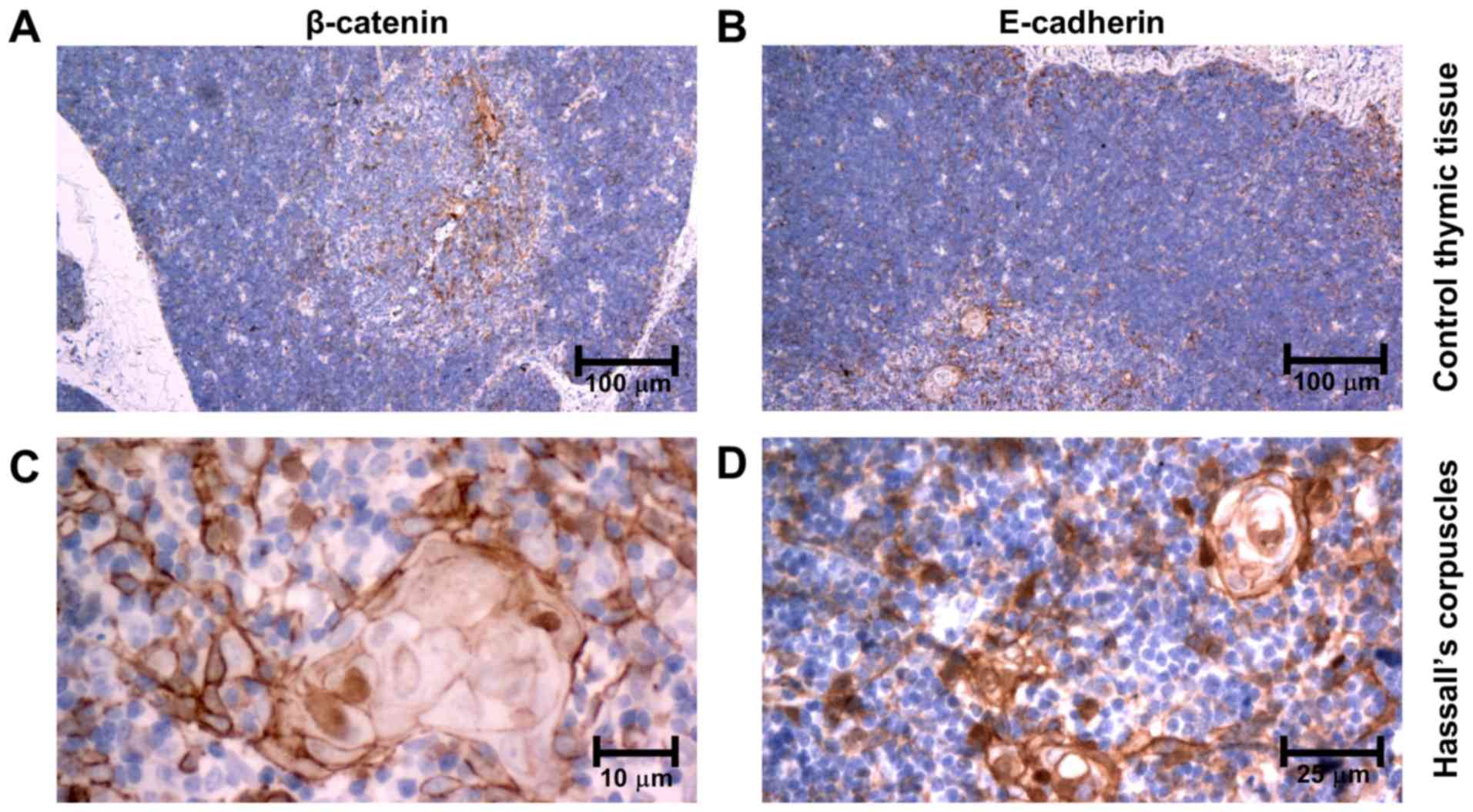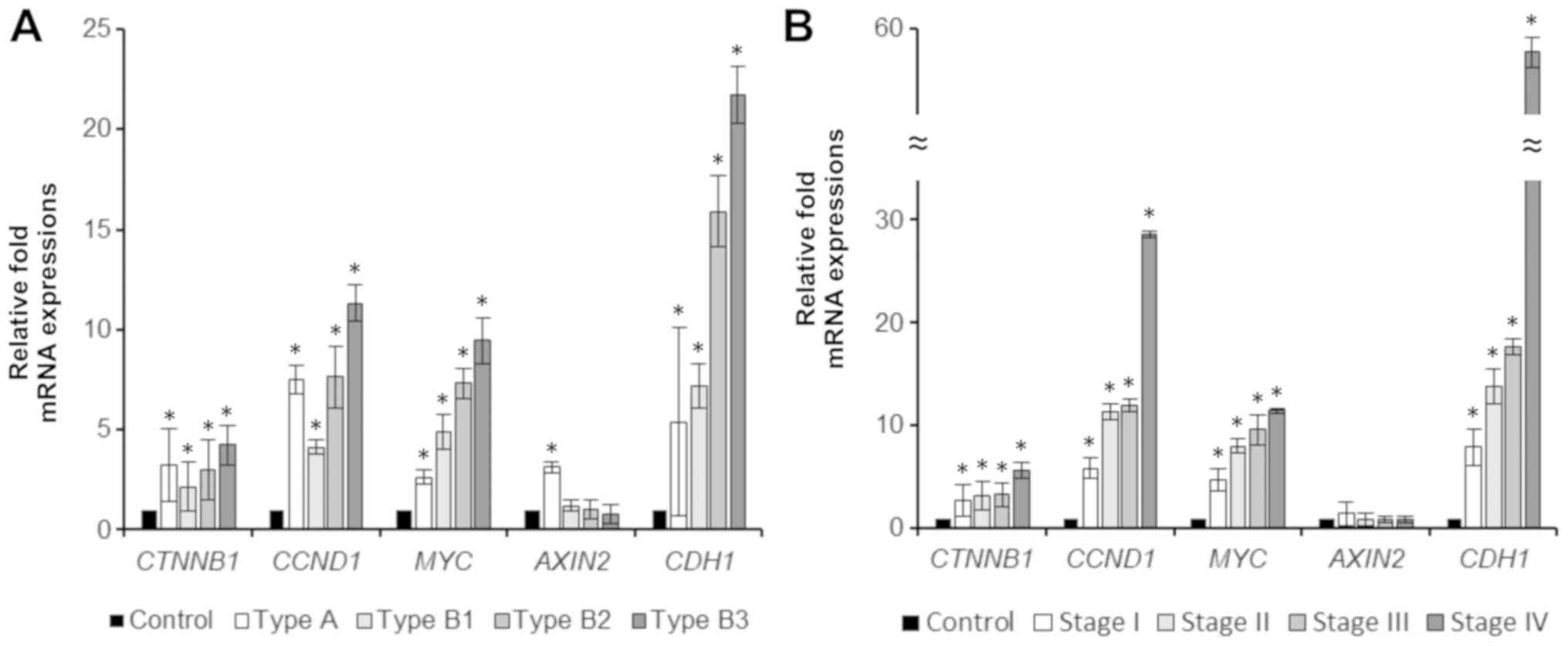|
1
|
Travis W, Brambilla E, Burke A, Marx A and
Nicholson A: WHO Classification of Tumours of the Lung, Pleura,
Thymus and Heart. IARC Press. (Lyon). 2015.
|
|
2
|
Li Q, Su YL and Shen WX: A novel
prognostic signature of seven genes for the prediction in patients
with thymoma. J Cancer Res Clin Oncol. 145:109–116. 2019.
View Article : Google Scholar : PubMed/NCBI
|
|
3
|
Girard N: Thymic tumors: Relevant
molecular data in the clinic. J Thorac Oncol. 5:(10 Suppl 4).
S291–S295. 2010. View Article : Google Scholar : PubMed/NCBI
|
|
4
|
Inoue M, Starostik P, Zettl A, Ströbel P,
Schwarz S, Scaravilli F, Henry K, Willcox N, Müller-Hermelink HK
and Marx A: Correlating genetic aberrations with World Health
Organization-defined histology and stage across the spectrum of
thymomas. Cancer Res. 63:3708–3715. 2003.PubMed/NCBI
|
|
5
|
Liang CC, Lu TL, Yu YR, You LR and Chen
CM: β-catenin activation drives thymoma initiation and progression
in mice. Oncotarget. 6:13978–13993. 2015. View Article : Google Scholar : PubMed/NCBI
|
|
6
|
International Non-Hodgkin's Lymphoma
Prognostic Factors Project, . A predictive model for aggressive
non-Hodgkin's lymphoma. N Engl J Med. 329:987–994. 1993. View Article : Google Scholar : PubMed/NCBI
|
|
7
|
Sehn LH, Berry B, Chhanabhai M, Fitzgerald
C, Gill K, Hoskins P, Klasa R, Savage KJ, Shenkier T, Sutherland J,
et al: The revised International Prognostic Index (R-IPI) is a
better predictor of outcome than the standard IPI for patients with
diffuse large B-cell lymphoma treated with R-CHOP. Blood.
109:1857–1861. 2007. View Article : Google Scholar : PubMed/NCBI
|
|
8
|
Girard N, Ruffini E, Marx A, Faivre-Finn C
and Peters S; ESMO Guidelines Committee, : Thymic epithelial
tumours: ESMO Clinical Practice Guidelines for diagnosis, treatment
and follow-up. Ann Oncol. 5 (Suppl 26):v40–v55. 2015. View Article : Google Scholar
|
|
9
|
Boehm T and Swann JB: Thymus involution
and regeneration: Two sides of the same coin? Nat Rev Immunol.
13:831–838. 2013. View
Article : Google Scholar : PubMed/NCBI
|
|
10
|
Detterbeck FC, Nicholson AG, Kondo K, Van
Schil P and Moran C: The Masaoka-Koga stage classification for
thymic malignancies: Clarification and definition of terms.
Zhongguo Fei Ai Za Zhi. 17:75–81. 2014.(In Chinese). PubMed/NCBI
|
|
11
|
Bijwaard KE, Aguilera NS, Monczak Y,
Trudel M, Taubenberger JK and Lichy JH: Quantitative real-time
reverse transcription-PCR assay for cyclin D1 expression: utility
in the diagnosis of mantle cell lymphoma. Clin Chem. 47:195–201.
2001. View Article : Google Scholar : PubMed/NCBI
|
|
12
|
Livak KJ and Schmittgen TD: Analysis of
relative gene expression data using real-time quantitative PCR and
the 2(-Delta Delta C(T)) method. Methods. 25:402–408. 2001.
View Article : Google Scholar : PubMed/NCBI
|
|
13
|
Strobel P, Hohenberger P and Marx A:
Thymoma and thymic carcinoma: Molecular pathology and targeted
therapy. J Thorac Oncol. 5 (10 Suppl 4):S286–290. 2010. View Article : Google Scholar : PubMed/NCBI
|
|
14
|
Zhou R, Zettl A, Ströbel P, Wagner K,
Müller-Hermelink HK, Zhang S, Marx A and Starostik P: Thymic
epithelial tumors can develop along two different pathogenetic
pathways. Am J Pathol. 159:1853–1860. 2001. View Article : Google Scholar : PubMed/NCBI
|
|
15
|
Hankey W, Frankel WL and Groden J:
Functions of the APC tumor suppressor protein dependent and
independent of canonical WNT signaling: Implications for
therapeutic targeting. Cancer Metastasis Rev. 37:159–172. 2018.
View Article : Google Scholar : PubMed/NCBI
|
|
16
|
Stamos JL and Weis WI: The β-catenin
destruction complex. Cold Spring Harb Perspect Boil. 5:a0078982013.
View Article : Google Scholar
|
|
17
|
Yamulla RJ, Kane EG, Moody AE, Politi KA,
Lock NE, Foley AV and Roberts DM: Testing models of the APC tumor
suppressor/β-catenin interaction reshapes our view of the
destruction complex in Wnt signaling. Genetics. 197:1285–1302.
2014. View Article : Google Scholar : PubMed/NCBI
|
|
18
|
Nakamura T, Hamada F, Ishidate T, Anai K,
Kawahara K, Toyoshima K and Akiyama T: Axin, an inhibitor of the
Wnt signalling pathway, interacts with beta-catenin, GSK-3beta and
APC and reduces the beta-catenin level. Genes Cells. 3:395–403.
1998. View Article : Google Scholar : PubMed/NCBI
|
|
19
|
Zhang L and Shay JW: Multiple roles of APC
and its therapeutic implications in colorectal cancer. J Natl
Cancer Inst. 109:2017. View Article : Google Scholar
|
|
20
|
Hirschman BA, Pollock BH and Tomlinson GE:
The spectrum of APC mutations in children with hepatoblastoma from
familial adenomatous polyposis kindreds. J Pediatr. 147:263–266.
2005. View Article : Google Scholar : PubMed/NCBI
|
|
21
|
Huber AH, Stewart DB, Laurents DV, Nelson
WJ and Weis WI: The cadherin cytoplasmic domain is unstructured in
the absence of beta-catenin. A possible mechanism for regulating
cadherin turnover. J Boil Chem. 276:12301–12309. 2001. View Article : Google Scholar
|
|
22
|
Gloushankova NA, Rubtsova SN and Zhitnyak
IY: Cadherin-mediated cell-cell interactions in normal and cancer
cells. Tissue Barriers. 5:e13569002017. View Article : Google Scholar : PubMed/NCBI
|
|
23
|
Yoshino I, Kase S, Yano T, Sugio K and
Sugimachi K: Expression status of E-cadherin and alpha-, beta-, and
gamma-catenins in thymoma. Ann Thorac Surg. 73:933–937. 2002.
View Article : Google Scholar : PubMed/NCBI
|
|
24
|
Wang Y, Li L, Li Q, Xie C and Wang E and
Wang E: Expression of P120 catenin, Kaiso, and metastasis tumor
antigen-2 in thymomas. Tumour Biol. 33:1871–1879. 2012. View Article : Google Scholar : PubMed/NCBI
|
|
25
|
Riess JW, West R, Dean M, Klimowicz AC,
Neal JW, Hoang C and Wakelee HA: GLI1, CTNNB1 and NOTCH1 protein
expression in a thymic epithelial malignancy tissue microarray.
Anticancer Res. 35:669–676. 2015.PubMed/NCBI
|
|
26
|
Pan CC, Ho DM, Chen WY, Chiang H, Fahn HJ
and Wang LS: Expression of E-cadherin and alpha- and beta-catenins
in thymoma. J Pathol. 184:207–211. 1998. View Article : Google Scholar : PubMed/NCBI
|
|
27
|
Kumar R and Bashyam MD: Multiple oncogenic
roles of nuclear beta-catenin. J Biosci. 42:695–707. 2017.
View Article : Google Scholar : PubMed/NCBI
|
|
28
|
Morgan RG, Ridsdale J, Tonks A and Darley
RL: Factors affecting the nuclear localization of β-catenin in
normal and malignant tissue. J Cell Biochem. 115:1351–1361. 2014.
View Article : Google Scholar : PubMed/NCBI
|
|
29
|
Zuklys S, Gill J, Keller MP, Hauri-Hohl M,
Zhanybekova S, Balciunaite G, Na KJ, Jeker LT, Hafen K, Tsukamoto
N, et al: Stabilized beta-catenin in thymic epithelial cells blocks
thymus development and function. J Immunol. 182:2997–3007. 2009.
View Article : Google Scholar : PubMed/NCBI
|
|
30
|
Staal FJ, Luis TC and Tiemessen MM: WNT
signalling in the immune system: WNT is spreading its wings. Nat
Rev Immunol. 8:581–593. 2008. View
Article : Google Scholar : PubMed/NCBI
|
|
31
|
Pongracz J, Hare K, Harman B, Anderson G
and Jenkinson EJ: Thymic epithelial cells provide WNT signals to
developing thymocytes. Eur J Immunol. 33:1949–1956. 2003.
View Article : Google Scholar : PubMed/NCBI
|
|
32
|
van Loosdregt J, Fleskens V, Tiemessen MM,
Mokry M, van Boxtel R, Meerding J, Pals CE, Kurek D, Baert MR,
Delemarre EM, et al: Canonical Wnt signaling negatively modulates
regulatory T cell function. Immunity. 39:298–310. 2013. View Article : Google Scholar : PubMed/NCBI
|
|
33
|
Evoli A and Lancaster E: Paraneoplastic
disorders in thymoma patients. J Thorac Oncol. 9 (9 Suppl
2):S143–S147. 2014. View Article : Google Scholar : PubMed/NCBI
|
|
34
|
Safieddine N, Liu G, Cuningham K, Ming T,
Hwang D, Brade A, Bezjak A, Fischer S, Xu W, Azad S, et al:
Prognostic factors for cure, recurrence and long-term survival
after surgical resection of thymoma. J Thorac Oncol. 9:1018–1022.
2014. View Article : Google Scholar : PubMed/NCBI
|
|
35
|
Ruffini E, Detterbeck F, Van Raemdonck D,
Rocco G, Thomas P, Weder W, Brunelli A, Evangelista A and Venuta F;
European Association of Thoracic Surgeons (ESTS) Thymic Working
Group, : Tumours of the thymus: A cohort study of prognostic
factors from the European Society of Thoracic Surgeons database.
Eur J Cardiothorac Surg. 46:361–368. 2014. View Article : Google Scholar : PubMed/NCBI
|
|
36
|
Engels EA and Pfeiffer RM: Malignant
thymoma in the United States: Demographic patterns in incidence and
associations with subsequent malignancies. Int J Cancer.
105:546–551. 2003. View Article : Google Scholar : PubMed/NCBI
|
|
37
|
Buske C, Hutchings M, Ladetto M, Goede V,
Mey U, Soubeyran P, Spina M, Stauder R, Trnený M, Wedding U, et al:
ESMO consensus conference on malignant lymphoma: General
perspectives and recommendations for the clinical management of the
elderly patient with malignant lymphoma. Ann Oncol. 29:544–562.
2018. View Article : Google Scholar : PubMed/NCBI
|

















